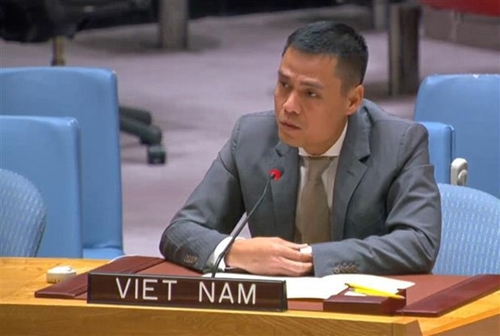In his remarks at an open debate on famine and conflict-induced global food security held by the U.N. Security Council (UNSC), the diplomat stressed that recent reports and discussions at the 43rd session of the U.N. Food and Agriculture Organization (FAO) Conference in Italy in July have shown that the world is facing an increasingly challenge regarding food security.
    |
 |
|
Ambassador Dang Hoang Giang, Permanent Representative of Vietnam to the United Nations |
Despite various sectors experiencing recovery after the COVID-19 pandemic, food insecurity remains a serious problem in many parts of the world, especially conflict-affected regions, he said.
Preventing violence and promoting peace is the most effective way to prevent famine in those regions, he said, stressing that the UNSC needs to play a more effective role in addressing the root causes of conflicts, thereby reducing the risks of conflict-caused food insecurity.
The Vietnamese representative called on all parties involved in conflicts to respect the U.N. Charter and international law, especially international humanitarian law, and not to destroy essential infrastructure crucial for the life of civilians, particularly women and children, as stipulated in Resolution 2573 proposed by Vietnam during its presidency of the UNSC in April 2021.
The UNSC should collaborate more closely with specialized agencies such as FAO, the U.N. World Food Program (WFP), and other international partners to address famine in conflict-affected areas, and enhance cooperation with regional organizations to strengthen the resilience of food systems and ensure global food supply chains, Giang said.
Food security is not only a goal but also a solution for Vietnam's socio-economic development, he affirmed, saying that the country prioritizes the development of low-emission and climate-resilient agriculture, with the aim of turning Vietnam into a food innovation hub in the region.
Vietnam is committed to actively contributing to global food security by maintaining a stable export of rice and other agricultural products, and willing to work with the international community to address food insecurity caused by conflicts, the diplomat said.
Participants said that it is essential to strengthen the role of the U.N., particularly the UNSC, in preventing conflicts and enhancing early warning systems for food security risks.
They also emphasized the necessity to improve the global food system in a more sustainable manner and ensure civilians’ access to food in conflicts.
Source: VNA